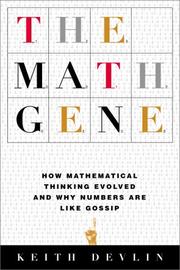| Listing 1 - 4 of 4 |
Sort by
|

ISBN: 0465016189 9780465016181 Year: 2000 Publisher: New York (N.Y.) : Basic books,
Abstract | Keywords | Export | Availability | Bookmark
 Loading...
Loading...Choose an application
- Reference Manager
- EndNote
- RefWorks (Direct export to RefWorks)
Mathematical ability. --- Mathematics --- Number concept. --- Psychological aspects. --- Number concept --- Mathematical ability

ISBN: 2020226863 9782020226868 Year: 1994 Volume: 101 Publisher: Paris : Seuil,
Abstract | Keywords | Export | Availability | Bookmark
 Loading...
Loading...Choose an application
- Reference Manager
- EndNote
- RefWorks (Direct export to RefWorks)
Fabrice fait des erreurs dans ses exercices de mathématiques. Il pense que c'est de sa faute, qu'il aurait dû les éviter. Personne ne lui a dit que l'erreur est, non seulement inévitable, mais nécessaire, dans l'activité du mathématicien professionnel comme dans celle du lycéen. A travers les réits de trois aventures pédagogiques saisies sur le vif, l'auteur dévoile les éléments sur lesquels devrait se fonder l'enseignement des mathématiques: le respect de la spécificité de chaque enfant et la patiente recherche des connaissances informelles-des déjà-savoirs profondément enracinés dans la subjectivité de chacun.

ISBN: 0226454924 0226454940 0226454932 9786611223779 1281223778 0226455033 0226454959 9786611223786 1281223786 0226455068 9786611431105 1281431109 0226455041 9780226455037 9780226455044 9780226454924 9780226454931 9780226454948 Year: 1976 Volume: 2 Publisher: Chicago, Ill. University of Chicago Press
Abstract | Keywords | Export | Availability | Bookmark
 Loading...
Loading...Choose an application
- Reference Manager
- EndNote
- RefWorks (Direct export to RefWorks)
This first book of a three-volume study examines the way trade policies in developing countries affect the level and composition of employment. There is special emphasis on the effects of import substitution policies that attempt to make a country self-sufficient by producing local substitutes for imports, as compared with policies that further the expansion of imports. Ten countries are studied: Brazil, Chile, Colombia, Indonesia, the Ivory Coast, Pakistan, South Korea, Thailand, Tunisia, and Uruguay. The contributors to the volume analyze the link between trade strategies and employment within a common framework, and the analyses of trade policy include the level and structure of protection, the relation of trade policy to labor demand, the labor intensiveness of trade, and the extent of distortions in factor markets and their effects on trade.
Didactic evaluation --- Educational psychology --- Didactics of mathematics --- Mathematical ability --- #WWIS:AGGR --- #PEDA *015.3 --- #PEDA *2.851 --- #PEDA *P 0 <47> --- Arithmetical ability --- Number ability --- Ability --- Foreign trade and employment --- 331.5 --- Arbeidsmarkt. Werkgelegenheid --(algemeen) --- 331.5 Arbeidsmarkt. Werkgelegenheid --(algemeen) --- 331.526 --- Levels of employment. Employment situation, conditions --- 331.526 Levels of employment. Employment situation, conditions --- -339.5 Buitenlandse handel. Internationale handel. Ruilvoet --- Learning, Psychology of --- 339.5 --- 339.96 --- 339.5 Buitenlandse handel. Internationale handel. Ruilvoet --- Buitenlandse handel. Internationale handel. Ruilvoet --- 339.96 Ontwikkelingshulp. Ontwikkelingssamenwerking. Ontwikkelingsproblematiek --- Ontwikkelingshulp. Ontwikkelingssamenwerking. Ontwikkelingsproblematiek --- Learning --- Psychology of learning --- Comprehension --- Learning ability --- Psychological aspects --- Underdeveloped areas --- -Addresses, essays, lectures --- Labour market --- Foreign trade. International trade --- Developing countries --- Commerce. --- E-books --- Employment and foreign trade --- Labor market --- Commerce --- International trade --- Labor supply --- Investments, Foreign, and employment --- Trade adjustment assistance --- Effect of international trade on --- Addresses, essays, lectures --- -339.96 Ontwikkelingshulp. Ontwikkelingssamenwerking. Ontwikkelingsproblematiek --- -Ontwikkelingshulp. Ontwikkelingssamenwerking. Ontwikkelingsproblematiek --- Foreign trade and employment - Developing countries --- Developing countries - Commerce - Addresses, essays, lectures --- trade regimes, labor, employment, prices, credit, taxes, taxation, wages, exchange rates, developing countries, commerce, business, finance, economy, economics, nonfiction, multinational firms, skill, capital, brazil, export, growth, substitution, manufacturing, factor allocations, income, protection, colombia, supply, international, foreign, investment, industry. --- study, trade policy, policies, developing world, employment, employer, job, workforce, workplace, workers, substitution, self sufficient, local, imports, exports, brazil, chile, colombia, indonesia, ivory coast, pakistan, south korea, thailand, tunisia, uruguay, strategies, protection, labor, market, marketplace, essay collection, academic, scholarly, research. --- -Foreign trade and employment
Book
ISBN: 1647820111 1647820103 9781647820107 Year: 2022 Publisher: Boston, Massachusetts Harvard Business Review Press
Abstract | Keywords | Export | Availability | Bookmark
 Loading...
Loading...Choose an application
- Reference Manager
- EndNote
- RefWorks (Direct export to RefWorks)
"The digital revolution is here. It's changing how work gets done, how industries are structured, and how people from all walks of life work, behave, and relate to each other. To thrive in a world driven by data and powered by algorithms, we must learn to see, think, and act in new ways. We need to develop a digital mindset. But what does that mean? Some fear it means that in the near future we will all need to become technologists who master the intricacies of coding, algorithms, AI, machine learning, robotics, and who-knows-what's-next. This book introduces three approaches-Collaboration, Computation, and Change-that you need for a digital mindset and the perspectives and actions within each approach that will enable you to develop the digital skills you need. With a digital mindset, you can ask the right questions, make smart decisions, and appreciate new possibilities for a digital future. Leaders who adopt these approaches will be able to develop their organization's talent to prepare their company for successful and continued digital transformation. Award-winning researchers and professors Paul Leonardi and Tsedal Neeley will show you how, and let you in on a surprising and welcome secret: developing a digital mindset isn't as hard as we think. Most people can become digitally savvy if they follow the "30% rule"-the minimum threshold that gives us just enough digital literacy to understand and take advantage of the digital threads woven into the fabric of our world"--
Technological innovations. --- Computer literacy. --- Artificial intelligence. --- AI (Artificial intelligence) --- Artificial thinking --- Electronic brains --- Intellectronics --- Intelligence, Artificial --- Intelligent machines --- Machine intelligence --- Thinking, Artificial --- Bionics --- Cognitive science --- Digital computer simulation --- Electronic data processing --- Logic machines --- Machine theory --- Self-organizing systems --- Simulation methods --- Fifth generation computers --- Neural computers --- Digital literacy --- Literacy, Computer --- Technological literacy --- Breakthroughs, Technological --- Innovations, Industrial --- Innovations, Technological --- Technical innovations --- Technological breakthroughs --- Technological change --- Creative ability in technology --- Inventions --- Domestication of technology --- Innovation relay centers --- Research, Industrial --- Technology transfer --- Numeracy. --- Mathematical ability --- Mathematics --- Statistics --- Technological innovations --- Computer literacy --- Numeracy --- Success in business --- Artificial intelligence --- Success in business. --- Computer Literacy --- Artificial Intelligence --- #KVHA:Algemeen wetenschap en cultuur --- #KVHA:Artificiele intelligentie --- #KVHA:Technologie --- #KVHA:Digitale geletterdheid --- Computational Intelligence --- AI (Artificial Intelligence) --- Computer Reasoning --- Computer Vision Systems --- Knowledge Acquisition (Computer) --- Knowledge Representation (Computer) --- Machine Intelligence --- Acquisition, Knowledge (Computer) --- Computer Vision System --- Intelligence, Computational --- Intelligence, Machine --- Knowledge Representations (Computer) --- Reasoning, Computer --- Representation, Knowledge (Computer) --- System, Computer Vision --- Systems, Computer Vision --- Vision System, Computer --- Vision Systems, Computer --- Heuristics --- Computer Literacies --- Literacies, Computer --- Information Literacy --- Business --- Business failures --- Creative ability in business --- Prediction of occupational success --- digitalisering --- algoritmer --- AI --- kunstig intelligens --- Artificiële intelligentie --- IT-toepassingen --- Innovatie ; ondernemingen
| Listing 1 - 4 of 4 |
Sort by
|

 Search
Search Feedback
Feedback About UniCat
About UniCat  Help
Help News
News